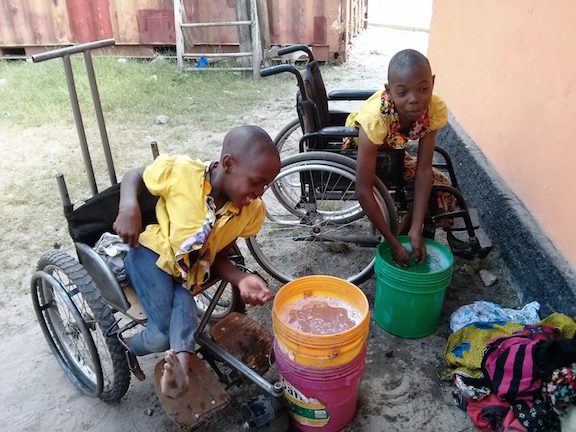gallery ids=”17454,17455,17451,17456″]
Matumaini School has been serving disabled youth since 1969.
By Rachel Thieme –
The Salvation Army in Tanzania educates and cares for children often shunned by their society through the Matumaini School in Temeke, the largest primary boarding school in the country serving children with disabilities and albinism.
Elizabeth is one of 201 children ages 7-20 currently enrolled at the school. With both legs amputated just below the knee due to gangrene, Elizabeth’s parents brought her to Matumaini when she was 7 and she has attended for the past five years. Twenty percent of her classmates are albino and 80 percent have disabilities, including missing or deformed limbs and stunted growth.
According to the International Labour Organization, more than 3 million individuals (or 9 percent of the population) in Tanzania have a disability. Often undereducated, they lack the skills needed to make a living, resulting in increased unemployment and poverty. The Human Development Index classified Tanzania as a country with “Low Human Development,” ranking it 160 out of 196 countries on its scale.
As a registered school, the government provides Matumaini with teachers and the Ministry of Education regulates its curriculum. However, because it is a private school, The Salvation Army is responsible for all operational expenses.
“All of the services provided in the school depend on donations collected from different territories and indigenous people,” said Captain Anna Gibson, child sponsorship secretary in Tanzania. “This is due to the fact that most of children studying at Matumaini come from vulnerable families and impoverished communities where parents are unable to pay for meals, accommodation and treatment. We thank God we have some countries who donate and help us to keep the school running.”
Matumaini’s approach to development is holistic; along with education it provides Christian teachings, after-school activities, a medical dispensary, a physical therapist and an orthopedic technician. Additionally, each child receives vocational training in carpentry and tailoring.
“The aim of these classes is to empower the children to acquire different skills, considering that the employment opportunities are limited especially to those with disabilities,” Gibson said. “We believe and insist that if a child is empowered and possesses different skills, this will help him or her get employment and fight against stigmatization and will give him or her hope for the future. This will reduce the number of unemployed youths who are physically disabled as well as the number of beggars in the streets.”












